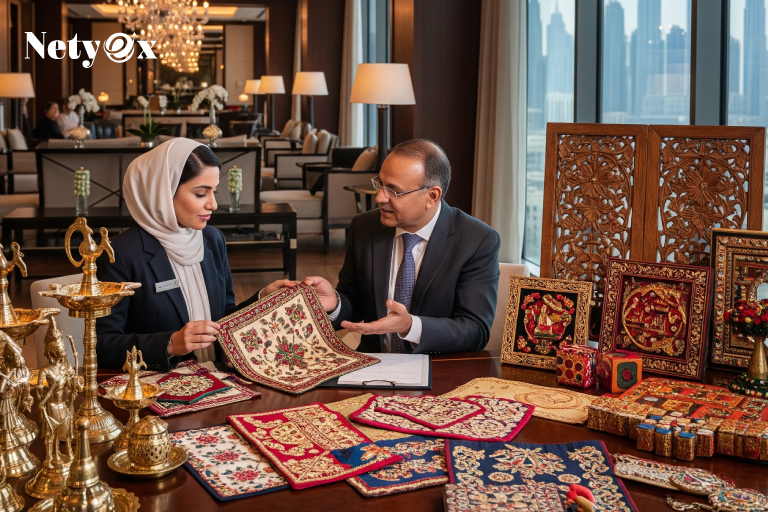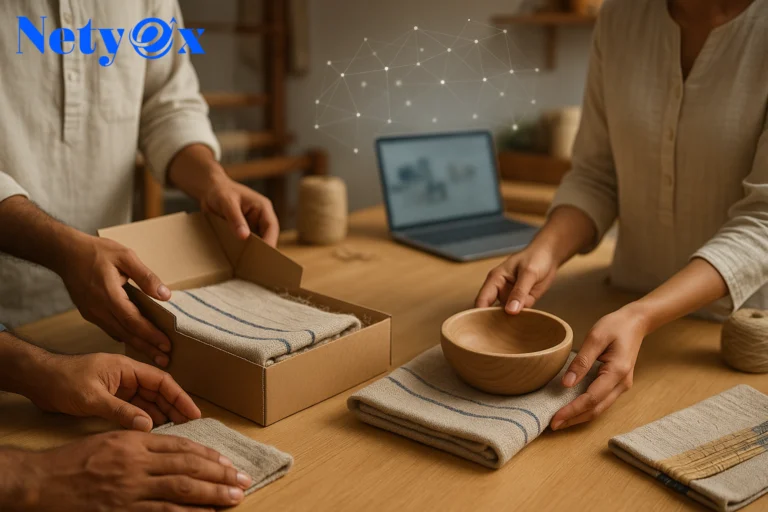Introduction to the Indian Handicrafts Export Market
India is globally recognized as the land of tradition, artistry, and timeless craftsmanship. From intricately carved wooden furniture to luxurious handwoven textiles, Indian handicrafts are admired worldwide for their authenticity and uniqueness. With globalization and cultural appreciation, the demand for Indian handicrafts has grown rapidly, particularly in the hospitality sector.
Among the many destinations, Dubai stands out as a hub of luxury tourism and premium hospitality, making it a lucrative market for Indian exporters. Hotels in Dubai are always on the lookout for authentic décor pieces, statement furniture, and sustainable handmade products to enhance their interiors. For Indian exporters, this presents a golden opportunity to tap into a billion-dollar industry.
Why Dubai Hotels Are a Huge Opportunity for Indian Handicrafts
Growth of the Hospitality Sector in Dubai
Dubai attracts over 14 million tourists annually, positioning itself as one of the top global tourism destinations. With this rapid growth, hotels in Dubai—from luxury five-star chains to boutique resorts—are constantly upgrading their interiors to create memorable guest experiences.
Demand for Authentic and Luxury Handcrafted Décor
Hotels in Dubai thrive on elegance and uniqueness. Rather than mass-produced décor, they prefer handmade, culturally rich items that give them a competitive edge in guest satisfaction. Indian handicrafts—being authentic, diverse, and customizable—fit perfectly into this demand.
Popular Indian Handicrafts in Demand by Dubai Hotels
Dubai hotels require a variety of décor items and functional pieces to create luxurious interiors. Here are some of the most sought-after Indian handicrafts:
Wooden Handicrafts and Antique Furniture
Carved wooden chairs, ornate tables, and heritage-inspired furniture are extremely popular in luxury hotels.
Handwoven Textiles and Rugs
Indian handloom rugs, carpets, and embroidered fabrics are used in hotel lobbies, guest rooms, and lounges.
Marble Inlay and Stone Craft
Inspired by Mughal architecture, marble tabletops, wall panels, and sculptures add grandeur to hotels.
Metal Art, Brassware, and Lighting Fixtures
Custom-made chandeliers, brass lamps, and wall sconces from India often become statement décor in Dubai hotels.
Eco-Friendly and Sustainable Handicrafts
With the rising trend of eco-conscious tourism, sustainable bamboo and jute crafts are highly in demand.
Legal Requirements for Exporting Handicrafts from India
Before exporting, Indian suppliers need to comply with legal and procedural guidelines. These not only ensure smooth trade but also help establish credibility with foreign buyers.
Registration with Export Promotion Council for Handicrafts (EPCH)
The EPCH is a government-backed organization supporting handicraft exporters. Registering with EPCH provides access to global trade fairs, buyer databases, and financial support schemes.
GST, IEC (Import Export Code), and Other Certifications
- IEC Code (Import Export Code): Mandatory for all exports.
- GST Registration: Required for domestic compliance.
- Certificate of Origin: Often requested by buyers in Dubai to verify authenticity.
Obtaining these certifications ensures your business is officially recognized and eligible for export benefits.
Compliance Rules for Importing Handicrafts into Dubai
Exporting to Dubai requires knowledge of UAE import laws. Hotels and procurement agencies prefer working with suppliers who are fully compliant.
UAE Customs Regulations
Dubai has strict customs procedures. Products must be declared, with correct HS codes and invoices.
Quality Standards and Safety Approvals
Hotels in Dubai expect world-class quality. Items must meet Dubai Municipality standards, especially furniture, textiles, and lighting products.
Labelling and Packaging Guidelines
Labels must include details such as:
- Country of origin (India)
- Material specifications
- Care instructions (for textiles and rugs)
Packaging must be sturdy enough for long-distance shipping, especially for fragile handicrafts like glass, marble, and ceramics.
Step-by-Step Process to Export Indian Handicrafts for Dubai Hotels
Here’s a clear roadmap for Indian exporters looking to tap into Dubai’s hotel market:
1. Identifying the Right Product Category
Choose products that align with hotel demand—luxury furniture, carpets, lighting, and eco-friendly items.
2. Market Research and Buyer Identification
Study Dubai’s hotel industry trends and identify key procurement managers, purchasing companies, and interior designers.
3. Pricing Strategy and Profit Margins
Dubai hotels prefer premium quality, but pricing must remain competitive. Factor in logistics, customs, and commissions while deciding your margins.
4. Shipping and Logistics Planning
Select between sea freight (cost-effective for bulk orders) and air freight (faster but expensive).
5. Clearing Customs in Dubai
Hire a reliable customs broker in Dubai to avoid delays. Submitting the right documents is crucial for quick clearance.
How to Find Hotel Buyers in Dubai for Indian Handicrafts
Connecting with Hotel Procurement Managers
Most luxury hotels have in-house procurement teams. Exporters can directly approach them with samples and catalogs.
Using Trade Fairs and Exhibitions in Dubai
Events like INDEX Dubai and Hotel Show Dubai are great platforms to meet hotel decision-makers.
Leveraging B2B Platforms and Export Portals
Websites like Alibaba, TradeIndia, and Global Sources help exporters connect with international buyers easily.
Best Marketing Strategies for Indian Handicrafts in Dubai’s Hospitality Market
Digital Marketing and Online Presence
Having a professional website showcasing your product range builds credibility. Social media platforms like Instagram and LinkedIn are vital for B2B networking.
Collaborating with Interior Designers and Hotel Consultants
Interior designers play a key role in hotel décor decisions. Building relationships with them increases export chances.
Building Long-Term Supplier Relationships
Consistency in quality and timely delivery ensures repeat orders from hotels.
Choosing the Right Logistics Partner for Dubai Exports
Sea Freight vs Air Freight
- Sea Freight: Cost-effective for heavy furniture and bulk handicrafts.
- Air Freight: Suitable for urgent deliveries and lightweight items.
Packaging and Insurance Considerations
Fragile items like marble, ceramics, and glass must be securely packaged with cushioning. Always insure your shipments to minimize risk.
Challenges Faced in Exporting Handicrafts and How to Overcome Them
Competition from Other Countries
China, Turkey, and Vietnam are also strong suppliers. The key is to highlight authenticity and heritage value of Indian handicrafts.
Managing Costs and Currency Exchange
Currency fluctuations can affect profit margins. Using forward contracts and hedging strategies can minimize risk.
Ensuring Quality and Timely Delivery
Hotels expect flawless products. Conduct strict quality checks and plan logistics early to avoid delays.
Government Schemes and Incentives for Indian Handicraft Exporters
Export Subsidies and Duty Drawback Schemes
The Indian government offers MEIS (Merchandise Exports from India Scheme) benefits and duty drawback facilities to reduce export costs.
EPCH Support and Export Promotion Events
EPCH organizes international fairs where Indian exporters can showcase products to buyers from Dubai and other countries.
Case Study: Successful Indian Handicraft Exports to Dubai Hotels
An Indian exporter from Jaipur supplying handmade carpets and wooden furniture secured contracts with multiple five-star hotels in Dubai. By leveraging INDEX Dubai Exhibition and building strong relations with hotel consultants, the exporter established a long-term supply chain, growing annual revenue by 45%.
Future of Indian Handicraft Exports to Dubai’s Hospitality Sector
The demand for sustainable, handcrafted, and luxury items is only going to increase. With Dubai hosting Expo 2030 and constant hotel expansions, Indian handicraft exporters have immense opportunities in the coming decade.
Frequently Asked Questions (FAQs)
1. What documents are required to export handicrafts from India to Dubai?
You need an IEC Code, commercial invoice, packing list, certificate of origin, and EPCH registration.
2. Which Indian handicrafts sell best in Dubai hotels?
Wooden furniture, marble inlay work, brass lighting, and handwoven carpets are highly popular.
3. How can I find hotel buyers in Dubai?
Attend trade fairs like Hotel Show Dubai, connect with procurement managers, and use B2B export platforms.
4. Is air freight or sea freight better for exporting handicrafts?
Sea freight is cheaper for bulk shipments, while air freight is better for urgent or delicate items.
5. Do Indian exporters get government support for handicraft exports?
Yes, schemes like MEIS, duty drawback, and EPCH support programs are available.
6. How do I ensure my handicrafts meet Dubai’s quality standards?
Work with certified suppliers, conduct regular quality checks, and comply with Dubai Municipality regulations.
Conclusion
Exporting Indian handicrafts for hotels in Dubai is more than just a business—it’s about bringing India’s culture, artistry, and craftsmanship to one of the world’s most luxurious hospitality markets. With strategic planning, compliance with regulations, and the right marketing approach, Indian exporters can unlock incredible opportunities in Dubai’s booming hotel industry.
By focusing on authenticity, sustainability, and reliability, you can build long-term business relationships that not only generate revenue but also promote India’s heritage globally.
👉 If you’re an exporter, now is the right time to step into the Dubai hotel market and make your mark with Indian handicrafts.













